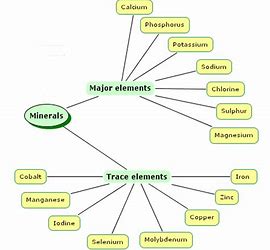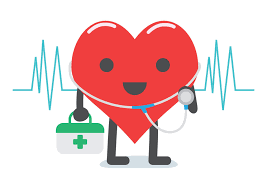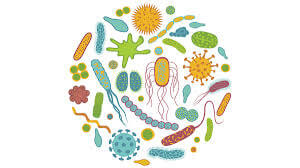Welcome back to the FINAL topic in our Mineral Series on Trace Minerals for vitality! Our goal for this whole series is to reveal the importance of minerals. They are critical for various electro-chemical processes to occur in our body. Without them we would not be able to keep the water we need in our bodies (and we’re 70%-80% water). We also wouldn’t be able access many nutrients needed for our body to perform simple tasks like– using the muscles, tendons, and bones to open this email! Trace minerals (even though we need very little of them) are also equally as important to perform every day functions as well and contribute to our overall vitality!
Trace Minerals
As discussed above Trace Minerals are only needed in minimal amounts in order to be effective in the body. Many people do not consider how important these B-list minerals are! We will showcase nine of the more common trace minerals that are essential for the health of our body.
- Chromium: As you may remember we discussed this mineral in one of the series because it is one of the more common trace minerals. It can help enhance the role of insulin in the body allowing for proper blood sugar levels. Read more about the benefits of Chromium in our blog.
- Copper: This trace mineral is needed to assist with the uptake of iron in the system, to help create red blood cells. It works in conjunction of other minerals as well.
- Fluorine: We need this mineral to help with the crystallization of our bones and teeth– helping them to maintain structural support.
- Iodine: Iodine is used to create thyroxine (T4 hormone) and triiodothyronine (T3), two of the main hormones produced by the thyroid that control numerous important functions.
- Iron: As stated above, Iron mainly helps with creating red blood cells (RBCs)– our RBCs are responsible for transporting oxygen throughout the body. This process makes Iron crucial for our vitality.
- Manganese: This little known mineral mainly works along side with other minerals like Calcium, Zinc, and Copper to support bone health.
- Molybdenum: Helps with the metabolism of Iron into the system as well as helps detoxify harmful substances from the body. Also effective for minimizing yeast/candida in the system!
- Selenium: This popular trace mineral is highly beneficial for fighting cancer (especially breast and brain cancers), boosting the immune system, supports fertility and reproduction, and boosts thyroid health.
- Zinc: Known mainly for boosting the immune system, it also helps with hormone production, proper growth and repair, and promoting normal digestion. Zinc is a must have for the cold and flu season!
Foods with Trace Minerals
Most foods that we eat will contain various trace minerals– making it easy to receive them synergistic-ally! Remember that the amount of trace minerals contained in a vegetable or fruit will depend on the soil that it is grown in and whether or not it is organic (organic foods tend to have a more diversified mineral content). Seafood will also be a good source of them– go for wild caught rather than farmed for a larger concentration of minerals and other nutrients. Organic and free range meats will also be more likely to contain higher levels of trace minerals as well. Here’s a quick break down of foods that will provide the body with these essential minerals:
- Chromium: Broccoli, potatoes, grapes, garlic, basil
- Copper: Liver, meat, seafood (especially oysters), beans, whole grains, soy flour, wheat bran, almonds, avocados, barley, garlic, nuts, oats, blackstrap molasses, beets, lentils
- Fluorine: Tea, coffee, shellfish, grapes, potatoes
- Iodine: Seaweed, kelp, tuna, cod, shrimp, dairy products, iodized salt (not the best source of Iodine)
- Iron: Shellfish, spinach, liver, legumes, red meat, pumpkin seeds, quinoa
- Manganese: Almonds, pecans, legumes, oatmeal, leafy greens, dark chocolate
- Molybdenum: Legumes, nuts, dairy products, cereal grains and leafy green vegetables
- Selenium: Brazil nuts, eggs, liver, tuna, cod, sunflower seeds
- Zinc: Oysters, red meat, Alaskan king crab, dark meat chicken, mushrooms, garlic
Supplementing with Trace Minerals
If you want to concentrate on a specific trace mineral you can always try supplementing with it. Here are a few suggested options:
- Viva Vitamins Super Iron Complex— This is a popular iron supplement that contains vitamin C as well as some B vitamins to help the body absorb the iron more efficiently.
- Now Selenium— A plain and simple way of upping your intake of Selenium.
- Now Kelp— Kelp is a natural source of Iodine and can be a great way to boost this trace mineral in your system.
Coupling with Trace Minerals
Jarrow Selenium Synergy— This formula contains Vitamin E and Selenium that will work as powerful antioxidants in the body. They are also great for brain and breast health when paired together.
Now L-OptiZinc— Zinc is best taken with Copper because Zinc can interfere with the absorption of Copper (another trace mineral that is needed in the body). Now L-OptiZinc is a more absorb-able form of zinc that is paired with copper.
Trace Mineral Drops and Fulvic Acid Mineral Complex— Both of these liquid full-spectrum minerals will be highly beneficial for receiving a wide range of trace minerals!
*In order to receive the most minerals from your food and/or supplements is to address any possible gut health disorders for proper/maximum absorption!
This wraps up our series on minerals! Just to re-cap: Minerals work alongside enzymes to help detoxify our bodies– especially the liver. Every enzyme has a mineral that activates it– without the minerals present in the body these crucial enzymes will shut down. Without the action or presence of enzymes, our cells will cease to function properly. Be wise and re-mineralize!
As always, do what you feel is best for YOUR body — if you aren’t sure, ask your doctor. We are health ENTHUSIASTS not licensed practitioners.




0 Comments